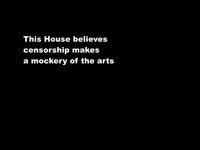This House believes censorship makes a mockery of the arts
Monday May 21 2012
MOTION PASSED
by 58% to 42%
Transcript
Order of speeches

Introduction
TIM
SEBASTIAN
Ladies and gentlemen, a very warm welcome to the
latest Doha Debate, the last in our eighth series – yes, we really are that old
– coming to you from the Gulf State of Qatar and sponsored by the Qatar
Foundation. Anyone who believed that censorship would die out with the arrival
of the internet has had to think again. A growing number of countries are still
battering free artistic expression. In many places it’s getting worse. Here in
the Arab world art is booming, at least in terms of new galleries – but so is
censorship. The black pen that scrawls all over pictures of women’s bare arms
and legs, or the pair of scissors that leaves a black hole in feature films
shown here in Gulf cinemas, are still in active daily use. So does society need
protection from artists and, if so, whom can we trust to make such decisions?
And in any case, isn’t art supposed to shock and unsettle us – isn’t someone
somewhere always going to be upset? Our motion tonight is that “Censorship
makes a mockery of the arts”, and our panellists are more than qualified to
argue it. Speaking for the motion, Nat Muller: an independent museum curator
and art critic, until recently she ran a gallery in Cairo and now shuttles
between Europe and the Middle East. And with her, Malek Jandali: he’s a Syrian
composer based in the US. In 2011 he received the Freedom of Expression Award
from the Council on American-Islamic Relations. Against the motion, Nada
Shabout: an Iraqi American art historian and director of the Contemporary Arab
and Muslim Cultural Studies Institute at the University of North Texas. And
Peter Florence: British founder and director of the Hay Festival Group, which
showcases writers and ideas from around the world. For the first time, the Hay
Festival will soon be held in Beirut. Ladies and gentlemen, that’s our panel. [applause] So could I now please ask Nat Muller to speak first for the motion.
Nat Muller
Speaking for the motion
NAT MULLER
Thank you, Tim. Ladies and gentlemen, art makes us see things anew. It pushes
out to boundaries of what is acceptable in form, in aesthetics, in ideas and in
concepts. And this might mean that art at times will disturb you, and it will
pull you out of your comfort zones. But that too is the beauty of art. Curtailing
that indeed makes a mockery of the arts. Most artists are actually censored in
their countries of residence or in the regions where they live in, so they’re
quite well aware of the socio-political sensitivities where they operate. An
example is Chinese artist Ai Weiwei or Iranian cinematographer Jafar Panahi,
who is serving a six-year jail sentence. Therefore we cannot let the argument of
cultural sensitivity become a euphemism for political or cultural repression if
every time governments, donors, audience members or others don’t like, disagree, feel disturbed or uncomfortable
with a work of art and then it becomes removed. We will end up, if we
endorse this, by very empty museums and art institutions – or, worse, artists
will feel intimidated, self-censor, artworkers as well, and they will take
their work elsewhere or go into exile. This is detrimental, not only to an art
scene but also to society at large, because it impoverishes it and homogenises
it. What we should also address is the issue of who is actually censoring the
artwork: what are their motives and what are their qualifications? Usually
censorship occurs because of power issues, sometimes money, but everybody
should be able to see art for themselves and make up their own minds how they
respond to a piece of art; not rely on governments, on censorship committees or
on (increasingly in Europe) boards of trustees or of donors to make that
decision for you. By censoring, you make a mockery of the arts because you
evacuate every possible dialogue or debate. You ban something – you remove it
from the world. As the last point I would like to make: no one is ever, ever forced to appreciate or like a work of art. You have the freedom to disagree
with it and to ignore it, even; but we should never try to make art ‘safe’ – it
should always continue to challenge us.
TIM SEBASTIAN
Nat Muller, thank you very much indeed. Don’t some artists like to get banned
or censored – they like the attention?
NAT MULLER
Not that I know.
TIM SEBASTIAN
I’m thinking of the American musician Kanye West: he commissioned an album
cover with a couple on the front who were having sex and made it known later
that he wanted the cover to be banned.
NAT MULLER
Well, the artists I know definitely do not like to be banned. They feel that’s
actually infringing on their freedom of expression.
TIM SEBASTIAN
Some people accuse Salman Rushdie, the author of The Satanic Verses, of
doing that. Didn’t Roald Dahl say, “Rushdie knew exactly what he was doing and
can’t plead otherwise. This kind of sensationalism does indeed get an
indifferent book onto the top of the bestseller lists, but to my mind,” said
Roald Dahl, “it’s a cheap way of doing it.”
NAT MULLER
And he also lives in hiding under
protection, so that’s also not a very nice way to live your life.
TIM SEBASTIAN
So that you don’t think artists need the publicity? They need to have a fight,
don’t they? They should have a fight.
NAT MULLER
But they should have a fight on the content of their work, not a fight about
fighting – their work being banned.
TIM SEBASTIAN
But they shouldn’t automatically accept that the public is going to say, “Yes,
this is for us,” or the public’s representatives in terms of government.
There’s no right to be shown everywhere, is there?
NAT MULLER
Oh, absolutely. But artists should be able to have at least an open debate.
And, again, no one is forced to like something, but that doesn’t mean you have
to remove it from the world.
TIM SEBASTIAN
If censorship makes a mockery of art, why is
art expanding in areas like the Gulf, for instance?
NAT MULLER
Well, I think that -
TIM SEBASTIAN
According to Christie’s a fantastic expansion.
NAT MULLER
Well, we’ll have to see how art is expanding in the Gulf. These are big
museums and there are big opportunities here. That is excellent. But -
TIM SEBASTIAN
And it’s changing attitudes, which is what you want.
NAT MULLER
Well, I wonder whether it has, because if work is being banned, for example in
Dubai, do we really have an open debate about the banned works?
TIM SEBASTIAN
It’s not that much work that’s being banned. A few paintings here and
there.
NAT MULLER
But it’s significant what’s being banned,
and it’s significant that there is no open debate about it.
TIM SEBASTIAN
And isn’t it in the end the fact that the censors actually make a mockery of themselves by censoring – out of touch, failing to understand what’s going on, failing
to change with the times?
NAT MULLER
Maybe, but why do we need to reinforce that? Why can’t the audience decide for
themselves what they enjoy or do not enjoy?
TIM SEBASTIAN
All right. Nat Muller, thank you very much indeed. Now could I please ask Nada
Shabout to speak against the motion.
Nada Shabout
Speaking against the motion
NADA SHABOUT
Yes. Well, I’m going to start by saying that censorship is not necessarily always the absence of freedom. Actually, let me be clear and say that I’m not by
any means or any stretch of imagination arguing for oppression of any sort or
repression – political, religious or artistic. However, censorship as a term
actually requires much definition. It has become to mean many things, but in
reality, the way I look at it, particularly in the arts, is a form of
limitations or restrictions that are due to certain sensibilities or
sensitivities, or a specific vision. You know, if you are applying for a grant,
there are certain guidelines, and these guidelines are going to tell you what
kind of art you can or you cannot make, anywhere in the world. So when we talk
about censorship in that sense, in many ways it also reflects the needs of the
audience by actually… you know, if we say that censorship makes a mockery of
the arts, then sometimes the arts equally makes a mockery of the audience. And
if we allow that, then we’re privileging the artist and censoring the audience.
So there needs to be some sort of form of a balance.
At times, as a matter of fact, these restrictions and limitations create
certain challenges that allow the artist to even surpass or be more creative.
It is much easier to break a rule than to actually create within that rule a
potent message. And this has happened all over the world in various times
throughout history. If we actually look at museums, we are not looking at art
that was created in total freedom; we are looking at art that was always
created in certain conditions. Now, actually my opinion: most of the time
censorship creates more publicity for the artist because it is for sure finding
a place in media, or at least particularly nowadays as media is more concerned
with censorship. So in that sense, you know, I say that all kinds of expression
can be made within various limitations. That is not necessarily a mockery or a
bad thing for the art in itself.
TIM SEBASTIAN
Okay, Nada Shabout, thank you very much indeed. You’ve been involved in
curating an exhibition here, and you said you felt a responsibility to practise
a degree of self-censorship. Is that right? You’re not in favour of censorship
but you wanted to do the state’s work for it. Why?
NADA SHABOUT
It’s not so simple. It’s not about censorship. I think we will censor in every
format we operate within, in the sense -
TIM SEBASTIAN
But you said we need to proceed slowly in a society that is traditionally very
conservative.
NADA SHABOUT
Because -
TIM SEBASTIAN
How slowly do you want to go – one bare leg at a time?
NADA SHABOUT
”One bare leg at a time” – no, it’s not about nudity. I mean, censorship is not
necessarily just about, you know, kind of nudity.
TIM SEBASTIAN
Not just about, but it’s part of it.
NADA SHABOUT
Right, it’s part of it as well, yes. But, you know, it is very important for me
as an educator or as an art historian who wants to, for instance, foster and
promote art – modern art specifically – in the Gulf, in Qatar for instance,
where I’m working: is to actually understand what the audience wants as well.
But what’s the point of shocking them?
TIM SEBASTIAN
Yeah, but you’re not talking about cultural sensitivity here; you’re talking
about pretending the world isn’t the way it is, aren’t you.
NADA SHABOUT
No, I’m not. The world needs to have some cultural sensitivity. There’s
nothing wrong with that.
TIM SEBASTIAN
It’s because you self-censor that they put labels on their art history books in
one of the universities here, which you said yourself was ridiculous.
NADA SHABOUT
Absolutely. Because exposure allows you to make decisions. However, it is the
sense of how you make that exposure.
TIM SEBASTIAN
It’s because you are doing the policing work for the state, isn’t it.
NADA SHABOUT
No, I’m not doing the policing work for the state.
TIM SEBASTIAN
You don’t think that wholly diminishes the value of the art inside these books?
NADA SHABOUT
No, it does not. No, it does not. No.
TIM SEBASTIAN
It doesn’t? When you’re inviting people to get offended when there are labels
warning people that they’re likely to be offended -
NADA SHABOUT
I didn’t say I agreed with that.
TIM SEBASTIAN
- by some of the great works of art in the world?
NADA SHABOUT
However, on the other hand what is this obsession with nudity in Western art?
TIM SEBASTIAN
Who mentioned nudity? [laughter]
NADA SHABOUT
Well, you’re - this is what’s being censored in these books. You did.
TIM SEBASTIAN
I said “one bare leg” – that’s not nudity.
NADA SHABOUT
”One bare leg” – so we’re talking about nudity.
TIM SEBASTIAN
That’s not nudity.
NADA SHABOUT
Yes, it is. It alludes to it.
TIM SEBASTIAN
It’s quite acceptable walking down Oxford Street in London, one bare leg -
NADA SHABOUT
Well, that is not acceptable walking down Souq Waqif.
TIM SEBASTIAN
- last time we looked. Last time we looked.
NADA SHABOUT
But not acceptable walking down Souq Waqif.
TIM SEBASTIAN
Your point being?
NADA SHABOUT
My point is that each context has its own limitations and restrictions and
freedoms.
TIM SEBASTIAN
And you go along with that? You wouldn’t push the boundaries at all?
NADA SHABOUT
I do. Art always pushes the boundaries. But by pushing the boundaries
you create other boundaries. So there are always -
TIM SEBASTIAN
By self-censoring?
NADA SHABOUT
There are boundaries. There are always boundaries. You push them, and you
slowly push them more and more, and eventually… But you still have boundaries.
There will never not have boundaries.
TIM SEBASTIAN
Okay. Nada Shabout, thank you very much indeed. Now could I please ask Malek
Jandali to speak for the motion.
Malek Jandali
Speaking for the motion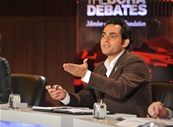
MALEK JANDALI
I believe censorship creates a mockery of the arts because censorship is a form of control. It’s dictatorship and it’s innately incompatible with the notion of free speech. What is art? Art is the search for beauty and truth. Art is an expression or application of the humankind imagination. It doesn’t always have to be ‘my way’ or ‘your way’. And censoring art only to suit my way or your way is unethical and is a violation of human rights. I was subject to censoring: I composed a song called I Am My Homeland in the United States, and an organisation tried their best to censor it and ban it from performance. But luckily I had my rights, and I succeeded in performing it at the White House. Lastly, I would like to say art is about information. When we ban information, we are hindering progress. The more information we have, the better. Thank you.
TIM SEBASTIAN
Malek Jandali, thank you very much indeed. You were censored by a group in the
United States. They ended up apologising and even paying your legal fees when
you sued them. But it did get you a lot of publicity, didn’t it.
MALEK JANDALI
Correct. Yes.
TIM SEBASTIAN
So that was a good thing that came out of it, to Nada Shabout’s point.
MALEK JANDALI
[laughs] True. I mean, they made my song go all over the place. But, you
know, they tried to ban it. They tried their best to just stop my performance,
and they couldn’t do that just because I have rights. I mean, art is about the
free expression of human beings.
TIM SEBASTIAN
It’s a bit more than that, though. I mean, you say, yes, it’s the search for
beauty and truth. But it’s about pushing boundaries, isn’t it.
MALEK JANDALI
I don’t think there are -
TIM SEBASTIAN
And when you push boundaries, you have to expect that people are going to push
back.
MALEK JANDALI
I don’t believe that there are boundaries in art. You know, let’s talk about
nature. Nature knows no indecencies. Indecencies are in the minds of people – we invent them.
TIM SEBASTIAN
But people have contexts. People have cultures.
MALEK JANDALI
Correct, yes.
TIM SEBASTIAN
Why shouldn’t you be aware of cultural sensitivities? You can’t push everything
and everybody at the same time, can you? And you’re going to have to expect
that if your art is seen in one particular culture as controversial, people are
going to push back. They’re going to fight against it.
MALEK JANDALI
Absolutely. Absolutely, that’s their right. But don’t censor it. They can just
ignore it. It’s up to them. But don’t ban me from creating that art, because I
am expressing my own true feeling and I’m searching for beauty and truth.
TIM SEBASTIAN
But the public has a right not to listen, not to view, not to read.
MALEK JANDALI
Absolutely.
TIM SEBASTIAN
And the public’s representatives acting on their behalf have a right to say,
“We don’t want the public to see this.”
MALEK JANDALI
It’s up to the individual. But don’t censor -
TIM SEBASTIAN
Censorship operates in Qatar, but you don’t see people demonstrating in the
streets saying, “We don’t want censorship.” They feel that the state is doing
what they’re asking them to do.
MALEK JANDALI
I disagree with that, because who are they to censor art or to ban information
from the -
TIM SEBASTIAN
The representatives of the people. If the people were unhappy with it,
presumably they’d make that known.
MALEK JANDALI
They don’t represent me.
TIM SEBASTIAN
But you were trying to get their attention, aren’t you. That’s the difference.
You want their attention.
MALEK JANDALI
No.
TIM SEBASTIAN
You want their backing. You want the -
MALEK JANDALI
Absolutely not. I am trying to express my feelings. And if they like it, that’s
fine. If they don’t, I’m sorry.
TIM SEBASTIAN
All right. Malek Jandali, thank you very much indeed. Could I now please ask
Peter Florence to speak against the motion.
Peter Florence
Speaking against the motion
PETER
FLORENCE
Thank you. This motion has to be opposed because it’s stupid. [laughter] It’s
stupid and it’s offensive. Censorship doesn’t make a ‘mockery’ of the arts; it
brutalises the arts. It shows an incredibly paranoid reaction to something that
might question some orthodoxy. And worst of all, it’s murderous. That’s not a
‘mockery’. Think about what my colleagues on this panel have said about art:
about its search for truth and beauty, about its need to challenge assumptions.
The fundamental thing that people who censor the arts want to silence is the
response to art: because art demands imagination, and it therefore demands
liberation in anyone who’s engaging with it. I’m massively less qualified than
everybody else on this panel to talk about censorship in art in the Arab world,
but let me from my, oh, ‘Western liberal perspective’ give you just for a
second some names: Aristophanes, Boccaccio, Mark Twain, Gustave Flaubert, Franz
Kafka, Doctor Seuss – all of them banned. Let me corral Ai Weiwei into this: a
man of extraordinary vision and great craft, who has been elevated by the
detention of the Chinese government into the most celebrated artist on the
planet. Censorship doesn’t work. It is quite often, as has been pointed
out by Tim, counterproductive. If all you want to do is silence people and
close their minds, don’t censor – maybe ignore, but don’t censor, because it’s dumb.
Let me add two more things just to that
list, two more extraordinary people: Ovid and Federico Garcia Lorca –
both of whom were killed by the states that sought to censor them. And yet the Metamorphoses and Lorca’s poetry have far outlived the Roman Empire and Franco’s
Falange. That’s why you have to oppose it: because it’s just a wrong
motion. Thank you.
TIM SEBASTIAN
Peter Florence, thank you very much indeed. You say that censorship doesn’t
work, but all over the world, all through history, it’s blighted lives, it’s
ruined careers, it’s caused people to commit suicide. It has worked –
it’s prevented the world from getting this body of work, this body of artistic
work, that could have made a huge difference to the world. It has worked.
PETER FLORENCE
The body of artistic work endures. You can kill the artist, but you can’t kill
the art.
TIM SEBASTIAN
Well, you can if the artist kills himself before he can do it.
PETER FLORENCE
The art survives.
TIM SEBASTIAN
How? How does it? You’ve mentioned the big names -
PETER FLORENCE
The arts survive in the public imagination.
TIM SEBASTIAN
You’ve mentioned the big names, haven’t you. Big names got through. Okay, big
names made it. What about the little names – what about the hundreds of people
during the blacklisting era in the United States whose careers were ruined –
actors, artists, directors, authors – all of them whose work never got to see the light of day after they were
blacklisted? Censorship does work.
PETER FLORENCE
But it gave hope to many of their colleagues who persevered and who came
through and succeeded and whose work is testimony, not only to their own
struggles but to the struggles of all those people who were sacrificed. Nobody
said being an artist was easy. And I defy Roald Dahl to know what was going on
in Salman Rushdie’s mind. But even if he was right -
TIM SEBASTIAN
He’s entitled to an opinion.
PETER FLORENCE
He is. But even if he was right, the artist puts their work out there knowing that they are challenging orthodoxies, knowing that there will be
people who disagree with them and will persecute them. That is an act of
extraordinary bravery that can only be commended.
TIM SEBASTIAN
What other word apart from ‘mockery’ would you use to describe the blacking-out
of women’s arms and legs in fashion magazines, or the clipping-out of a minute
or thirty seconds of a film, a feature film?
PETER FLORENCE
I wouldn’t necessarily regard the censorship of advertising as censorship.
TIM SEBASTIAN
Well, fashion photography’s an art, isn’t it?
PETER FLORENCE
I would call it ‘barbarism’ and I would call the murder of artists ‘murder’.
It’s not censorship and it’s not a mockery; it’s murder.
TIM SEBASTIAN
But a stunning piece of cinema, like a film that was shown here called Flowers
of War, a film that grossed $83 million in 17 days in China, had bits
snipped out of the middle of it. That’s mockery, isn’t it?
PETER FLORENCE
Why are you so obsessed with the money? The example you cite for the expansion
of the art market is not the artist’s or the gallerists’; it’s Christie’s.
That’s not an expansion of art; that’s an expansion of the purchase of art. And
it’s wholly different.
TIM SEBASTIAN
It’s one person’s view of art expanding.
PETER FLORENCE
But it’s the one that you put forward – and you’re in the chair of this BBC
debate. (Right, yeah) It’s not solely about the money; it’s about the
idea that will endure and the idea that will sink and germinate and become
something more exciting. That’s what art does.
TIM SEBASTIAN
Unless it’s reduced to ridicule by the censors?
PETER FLORENCE
I don’t think you reduce art to ridicule. If anything, as others have said,
it’s the other way round. It reminds you of the great satirist Peter Cook, who
quipped about the “cabaret of the Weimar Republic,” he said, “which did so much
to prevent the rise of Hitler.” There is mockery, sure, but it’s in the other
direction. Artists will always find – the ingenuity, the creativity of the
human brain will always find a way, through allegory, through metaphor, through
some divergent paths, to address -
TIM SEBASTIAN
And those that don’t will die and disappear?
PETER FLORENCE
No, not necessarily will die and disappear.
TIM SEBASTIAN
Well, plenty have. Plenty have along the way, yeah.
PETER FLORENCE
Plenty have. Plenty have, but plenty have survived, and their work has survived
longer than the regimes that sought to tyrannise them.
TIM SEBASTIAN
Okay, Peter Florence, thank you very much indeed. All right, just a reminder of
the motion that we’re discussing, that “Censorship makes a mockery of art.”
Peter Florence thinks it’s a stupid one, but we’re going to spend a lot of time
in the next forty minutes or so discussing it. We’ll take your questions,
ladies and gentlemen. So if you have one, please put your hand up and we’ll get
a microphone to you as soon as possible. Gentleman in the second row there,
please. If you’d stand up and just tell us where you’re from. Thank you.
Audience questions
AUDIENCE (M)
Yes, hi. I’m from Yemen. And if you change the word ‘censorship’ here, as like
arbitrary censorship, and society agrees on a set of regulations that, you
know, we don’t want to cross these boundaries, like we all talked about
boundaries: so if we all agree that radio – that you turn on the radio in your
car and should not have vulgar words when you have your two-year-old or your
five-year-old present in the car, would that be acceptable for the people on
this side, or even that is not acceptable?
TIM SEBASTIAN
Nat Muller.
NAT MULLER
Well, we’re not talking about radio;
we’re talking about art, right. So we should stick to the arts.
AUDIENCE (M)
Yes, music is art.
NAT MULLER
Yeah, but you can turn off the radio. I mean, it’s that simple. You can
choose not to go to the gallery. If people are concerned, the curators can put
up captions, warnings, as they do with cinema ratings. People should decide for
themselves. But maybe some people actually want to listen to whatever is
broadcast on the radio. But when you go to an exhibition, you can choose
whether you go through the door or not. If you’re not interested, you don’t go.
That’s still not a reason to prevent other people from going.
TIM SEBASTIAN
You want to come back on that?
AUDIENCE (M)
Yeah. I mean, who decides that? If the vast majority of society decides, “We
don’t want our public airwaves to air music which is fantastic art but
sometimes has vulgar words.” If the majority of society decides that, who
decides on the other side?
NAT MULLER
Well, that’s an excellent point: who decides it?
AUDIENCE (M)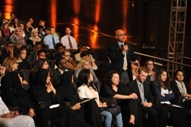
If the majority decide they don’t want that?
NAT MULLER
Why is it a majority? Usually it’s a few people -
AUDIENCE (M)
No, I’m not saying it is. It’s an if question.
NAT MULLER
- a few censors or a government and also in censorship. Also it’s quite
random: you know, whoever is in power might make different decisions.
AUDIENCE (M)
No, you’re making assumptions on my question. I’m not saying that we should.
I’m asking if – here’s an if with two underlines on it. If
society, a vast majority of society decides they want to put that regulation
and they want to live by these regulations, and you’re on the other side and
say, “No, you guys don’t understand anything. I’m going to force it and I’m
going to put it on the radio.” It’s an if question. It’s a challenging
question for you.
NAT MULLER
Okay, so if I have to answer the if question.
AUDIENCE (M)
Yes. It’s an if question.
NAT MULLER
If society does not know what the radio’s going to put on, how can it
decide to not have it?
TIM SEBASTIAN
Okay. Nada Shabout, yeah.
NADA SHABOUT
Now, I’ll give you another example. Remember the work of... For instance, in
Lebanon, there are several artists who did films that dealt with homosexuality.
I remember one Home Works, a forum, where we were taken in a bus to go
privately, you know, quietly, to go see that film. When we asked why – and in
fact one of the drivers of the buses said, “Oh, there’s the film. I would like
to watch it.” And he was someone from the Dahiya area, and we had to invent
this story for him, because we can’t tell him that, you know, we’re going to
watch a film that is not acceptable here in Lebanon. But it’s the people
actually who did not want... It was not a censorship, it was not something from
anywhere, but rather the people. And among the people who were there watching
the film, many of their parents were so uncomfortable they left. So then there
is a way of portraying it.
TIM SEBASTIAN
Okay, Malek Jandali, do you want to come back on that?
MALEK JANDALI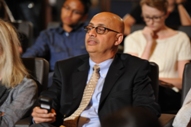
I mean, rather than censor the words we should educate ourselves and
educate your child or the recipient of that word, and let them understand it
before they reject it without even listening to it. That’s my argument.
TIM SEBASTIAN
Okay, I’m going to take a question from the gentleman up there in the second
row at the back. Yes, you, sir, yeah. We’ll get a microphone to you, please.
AUDIENCE (M)
Thank you very much. I’m from the United States, and my question for you is:
isn’t censorship in some way necessary for the creation of great art? We think
of people like Allen Ginsberg struggling with Howl against the censors
of the time; thinking about people like Banksy today, who are creating great
graffiti art against corporate censorship. Isn’t it necessary in some way for
the creation of art?
TIM SEBASTIAN
Okay. Nat Muller, you’d be steadfastly against that?
NAT MULLER
Well, how can it be necessary if some artists end up in jail or are
threatened? Will they feel safe making art? Is that a productive environment to
produce art? Artists will always face opposition, whatever they do. But if they
face censorship – and there’s this danger of self-censorship – you are really,
I think, curtailing creativity; you’re not actually promoting it. So I think
it’s detrimental to the arts.
TIM SEBASTIAN
Peter Florence, you’d go along with that, wouldn’t you?
PETER FLORENCE
No, I wouldn’t. There’s an element of truth to what you say, because I don’t
think there’s ever been any time when there hasn’t been some form of censorship. We work in the arts with what there
is. And if, to take the analogy that we had with this side, that there are a
set of rules that you work within, that’s not unlike having the boundaries of a
sports-field marked out. You play within the boundaries. And you perform
whatever art and craft you can to try and explain and reach people and create -
TIM SEBASTIAN
But unlike sports, you push those boundaries, don’t you.
PETER FLORENCE
Well, you push the boundaries of the people who are engaging with you. That’s
the crucial thing. You always work with whatever censorship there is, because
you have to if you’re an artist.
AUDIENCE (M)
But you think even though impressionists created their anti-salon, they created
their own outcast society where they were able to have their art in safety –
outside the rules of the game. They broke the rules. Isn’t that what art is? It
has to find the rules, it has to find the way to break those rules?
PETER FLORENCE
It has to if it’s going to keep progressing and if it’s going to regenerate
itself, yes, it has to react against whatever the previous generation did, the
previous generation of artists. But I think that’s a slightly different case to
the idea of censorship.
TIM SEBASTIAN
Malek Jandali.
MALEK JANDALI
I mean, what is censorship? Censorship is control and the attempt to
oppress or eliminate some sort of an expression. Let me quote Mark Twain. He
said: “Censorship is telling a man he can’t
have his steak just because a baby can’t chew it.” I mean, you can’t just
censor a word and say it doesn’t exist. It will exist.
TIM SEBASTIAN
Okay. If we can go to a lady in the second row. You had a question. If we can
get a microphone. It’s right behind you.
AUDIENCE (F)
Hi. I’m from the United States, and I represent an organisation called Index on
Censorship in the UK. I’m wondering: is the real answer here censorship? I
mean, are we really asking the question do we have the right to be offended –
you know, is that really what we’re talking about? And if that’s the case,
shouldn’t we be focusing more on creating spaces for people to disagree, for
people to say that “I have a different opinion,” rather than actually censoring
the art? Because the art should be the start of the conversation.
NADA SHABOUT
Absolutely.
TIM SEBASTIAN
Nada Shabout.
NADA SHABOUT
Well, I mean, yes. To some extent, yes. Clearly – I mean, again I’m going to
clarify: by no means am I talking about oppression. I do not condone killing of
the artist under any circumstances. However, sometimes works are censored
because whoever is censoring does not want the topic to be even debated. But if
we’re talking about not offending, yes: yes, you know, certain values are still
held by people very highly. And so if you offend them, they will react strongly.
So if we create the right spaces for that interaction to happen, then we avoid
this sort of oppression or repression. I think we’re talking about two or three
different kinds of censorships and topics here on this panel. So really it’s
not a simple, you know, “you’re censoring an art: you’re killing something.”
Yes, art is about pushing boundaries. Art is about making sort of a new
understanding for certain things.
AUDIENCE (F)
I mean, I think that in actuality our societies have things that we don’t like.
We have racism, we have bigotry – these are parts of our societies. And without
art we don’t confront these ugly things; we don’t talk about them. And to
silence them because we think that a majority finds them offensive, then we
continue to oppress the minority, don’t we?
NADA SHABOUT
Absolutely. I totally agree with you. But then there is a consensus, an
agreement about racism being something that we don’t like. However -
AUDIENCE (F)
But that doesn’t go away. Racism does not go away. As someone from the South of
the United States, racism does not go away. And part of the reason why it’s
still a part of the South is because we don’t talk about it, because we don’t
read Huckleberry Finn, because we don’t discuss it. That’s part of our
societies. And it needs to be a part of it.
TIM SEBASTIAN
So are you saying that art here, in regions like this, needs to be the start of
a debate, needs to provoke a debate?
AUDIENCE (F)
Yes, absolutely. Yes.
TIM SEBASTIAN
Okay. That’s why we’re here. A hand up there. Can’t see who it’s attached to –
a gentleman, yeah. Okay.
AUDIENCE (M)
Hi. I’m from Scotland. And I’ve got a very limited view on art, like I’ve not
seen a lot of it. But if you’re going to censor things and people are going to
view the censorships, aren’t they going to be forced to make their own
decisions on what’s censored to distort the message that’s trying to be sent –
can that create something different? Like, for example, my sister used to go to school here, and she was taking an art
course. And for part of this she painted a dancer on it. And when
displaying her work she had to cover part of it, which was the area of the
clothes, because apparently it seemed too graphic. And when she was asked about
it, people were asking her, “Is the woman naked? Are you drawing things like
this that are crude?” And she got a lot of judgment from that because it was
censored, and without the censorship, all of that, it would have been quite –
it wouldn’t have offended anyone, in my opinion, because it wasn’t showing
much skin; it was just showing a bit of legs and arms. It wasn’t showing any
breasts or parts.
TIM SEBASTIAN
So what’s your point here?
AUDIENCE (M)
My question is: if you’re going to censor certain parts and still show it,
isn’t that distorting the image and the message that the art’s meant to portray
to the public?
TIM SEBASTIAN
I think everybody would agree with that on this panel?
NADA SHABOUT
Yeah. I mean, we all agree with that. But then when we’re talking about
racism, it’s one topic. When we’re talking about nudity and how much leg you
show, that’s a cultural thing. Here they don’t like to see shorts. In America
we like to see shorts. So, you know, I mean, that is a cultural thing. That is
not a moral thing.
NAT MULLER
But, Nada, Nada, I just want to take issue with what you said earlier about
that artists are censoring the audience. Since when do artists have to cater to
the audience? I mean, you are the audience. You actually know what you want. Do
artists know what the audience wants? Isn’t that a very hyper-pragmatic
way of dealing with it?
NADA SHABOUT
No, not really. I mean, actually when we talked earlier and we brought
Christie’s somehow – the auction houses, in this discussion, and in reality
who’s censoring the art more than anyone else? It is the auction houses. Money
is, at the end, the thing that censors more than anything else, because to get
for the artist to produce, they need the money. So that funding regulates.
TIM SEBASTIAN
Malek Jandali, you want to say something?
MALEK JANDALI
I totally disagree. I think the artist has the right for free speech; so
does the viewer. What needs to happen is a healthy dialogue and a discussion,
not censorship. If you censor my art – let’s say we ban this word from the
radio – guess what, peep, everybody knows what it is; you go on Google
and you know it. Actually you pay more attention to it. I mean, the work is not
going to be eliminated; it’s going to be on Mars, it’s going to be still on
planet Earth. You just cannot eliminate and eradicate words or art or
expressions or music or whatever. Who are you to do that and be judgmental?
NAT MULLER
And you cannot sugarcoat the world, either.
NADA SHABOUT
No, but you can decide what can be public and what cannot be public.
MALEK JANDALI
Me?
NADA SHABOUT
No.
NAT MULLER
Who decides? Who decides?
NADA SHABOUT
Well, you know -
TIM SEBASTIAN
The people’s representatives. Represented by the censor.
NADA SHABOUT
Why is it the artist who decides?
NAT MULLER
Who are the people’s representatives? I mean, do they actually have
representatives? Appending where?
NADA SHABOUT
Why is the artist allowed more freedom than anyone else?
NAT MULLER
Well, it would be great if everyone would be allowed the same freedoms.
NADA SHABOUT
We’ll have to come to some agreement, though, somehow.
TIM SEBASTIAN
Okay. Lady in the second row. Yeah. If you would stand up, we’ll get a
microphone to you.
AUDIENCE (F)
Hello. I’m an artist, a visual artist, so I have to speak for -
TIM SEBASTIAN
Where are you from, please?
AUDIENCE #5 (FEMALE)
I am from Germany. Based in Germany at the moment. But I really have to speak
for the freedom of the arts. But in a way that’s why I want to ask Malek a
question: because you were saying censorship is a form of control. And for me,
somehow it always expresses a fear – it is not a form of control. Like there is
no control in this case, because art, as you said, will always exist. There is
no control for it. And I think Nat Muller made a good case with the case of
Jafar Panahi, who is banned from doing films but did a film that is titled This
Is Not A Film.
TIM SEBASTIAN
So you think censorship is just an expression of the insecurity of the state
that imposes it, is this what you’re saying?
AUDIENCE (F)
I think it can be targeted. And it has loopholes always because of that,
because it’s so subjective.
TIM SEBASTIAN
So it’s okay?
AUDIENCE (F)
It is not okay, definitely not. But still there is a way to work within this.
TIM SEBASTIAN
Malek Jandali, do you want to say something?
MALEK JANDALI
May I say something? The extreme of
censorship is assassination, it’s murder. I agree with you that, you know, a society that fears freedom will
have censorship because they are afraid to face freedom. Freedom is in
nature, is in most religions, is in God. The more information we have, the
closer to God we’re going to be. It’s about imagination and getting closer to
nature and to the Creator. And that’s what art is all about.
TIM SEBASTIAN
Nada Shabout.
NADA SHABOUT
And I actually agree with you that censorship is about insecurities. But
it’s not just insecurities of the few; it
could be insecurities of the many – cultural insecurities. And the way to deal
with it is not by trying to break it
and shock it immediately but in trying to find a space for negotiation. And art does that.
TIM SEBASTIAN
You don’t look very convinced by that argument.
NADA SHABOUT
Art does that within the boundaries of the regulations it has.
TIM SEBASTIAN
Let her come back. Let her come back.
AUDIENCE (F)
No, I wouldn’t say art has to do that within the boundaries you’ve mentioned.
But -
NADA SHABOUT
Yes, but how can you -
TIM SEBASTIAN
Could you let her reply, please.
AUDIENCE (F)
Also, you know, who is even saying that art has a purpose? For me it’s
something that is totally ridiculous.
Because it has none. It doesn’t even have to be political. There is no purpose in this. It is a subjective thing. But that is a good thing in a way, because
there’s a lot of...
TIM SEBASTIAN
Peter Florence, do you want to come in on this at all?
PETER FLORENCE
I think you’re absolutely right, and I think we’re agreed. Because the idea
that censorship can only come out of insecurity: if your belief system or your
religion or your political stance is so weak that it can brook no opposition,
no contrary position at all, then you’re going to be frightened by anyone, like
an artist, who offers a different view of the world. And when you said earlier,
Tim, that the world isn’t the way it is, artists don’t portray the world the
way it is – well, no, they don’t, and that’s not what they do. Artists portray
the world the way it might be. They portray human life the way it might be. It’s about possibility and potential. And it’s therefore about
liberation. And of course that’s a threat to anybody who’s insecure about the
system they’ve put in place.
TIM SEBASTIAN
Okay. There’s a lady just behind you who had a question. If you’d pass the
microphone back.
AUDIENCE (F)
Hello. I am from France. Voltaire, the famous French writer, wrote a lot of
philosophic tales during the eighteenth century to bypass the censorship. If
censorship didn’t exist, he would certainly just expose what he felt without
any creativity. And so it wouldn’t be art. So -
TIM SEBASTIAN
So you’re saying censorship was a help? Censorship was a good thing in this
case? Nat Muller, do you want to come in on that?
AUDIENCE (F)
Yes. Censorship can create an -
NAT MULLER
I think artists when they’re living in repressive societies they indeed
find a way of how to deal with it. But we can also imagine if they were not
living in repressive societies what they would be doing – I mean what potential
they would unleash then. I think it’s absolutely horrible to say that an artist
needs censorship in order to be creative – that’s like saying an artist needs
to suffer in order to be a good artist.
TIM SEBASTIAN
Okay. Lady in the front row. Yes, you. No, sorry, the lady towards the end. If
you’d stand up, please. Thank you.
AUDIENCE (F)
I am from Lebanon. And my question is for both panels: that art is a form of
education, a message from the artist to the society of any kind. So censoring
the artist and his work and the hours that he puts into his work, aren’t you
censoring a message that needs to be sent to the society, for whatever idea
that he has in his mind, or his or her mind, and anything that he would like to
send to the society?
TIM SEBASTIAN
Peter Florence.
PETER FLORENCE
If it’s not too glib – if you want to send a
message, use Facebook. [laughter] Art is fundamentally not about sending a message, or it’s not dictatorial, it’s not autocratic, and it
doesn’t require that you agree with it. It requires that you respond to
it – or you can ignore it. So I don’t want to appear impolite, but I think the
premise is wrong. I think artists give their work out into the world for people
to react to or not.
TIM SEBASTIAN
Nat Muller, do you want to come in?
NAT MULLER
I have to agree with Peter.
TIM SEBASTIAN
Do you want to come back on that?
AUDIENCE (F)
Yeah. I just think that some art pieces are a form of a message to the society,
and they get censored, and some of those
messages don’t get to the society and they get like put at the back. So
I find that that is like a really wrong idea to censor some stuff that needs to
be put out to the society.
TIM SEBASTIAN
Did you want to say something else?
PETER FLORENCE
No.
TIM SEBASTIAN
Okay, all right. We’ll go to a question. Gentleman up there.
AUDIENCE (M)
Yeah, hi. I’m from England. I’d just like to say there’s lots of censorship.
Now, as one of you were saying, sir, I can’t remember – Nat… When you walk into
a museum or an art gallery, let’s say you don’t want to walk in there because
there might be pictures that are inappropriate or something like that. But
let’s say there are pictures or art that you want to look at, but then one or
two are inappropriate and then they censor that: isn’t that okay for them to
do?
NAT MULLER
Again, what is inappropriate – inappropriate for whom?
AUDIENCE (M)
Yes, but as we’re living in an Arab world, I haven’t heard any of the panel
bring up the topic of religion. Like let’s say in Islam: in Islam it won’t be
appropriate in an art gallery for nude pictures to be put up.
MALEK JANDALI
Let me talk about Islam, because I’m a Muslim.
TIM SEBASTIAN
Please. Go ahead.
NAT MULLER
[laughs] You talk about Islam.
AUDIENCE (M)
I am Muslim as well – just saying.
MALEK JANDALI
Let me tell you about Islam. When Islam spread from India all the way to
Spain, they did not censor any kind of art. They did not demolish the pyramids.
They did not censor Kama Sutra. They did not eradicate the previous
religions of Moses and Jesus. They actually built on them. We had the Bayt al-Hikma,
or The House of Wisdom, founded by Harun ar-Rashid, and that was the first library in
humankind history. We built on the Indian mathematics and all the religions.
Artistics. We embraced everybody – everybody, no exclusion, no
censorship. And that’s why Islam excelled. The minute we censored and we said “It’s
my way or your way,” the Islamic civilization and empire started to collapse.
And now we are using the revival of the Islamic empire just because of freedom.
And that’s why we have the Arab Spring today.
NAT MULLER
I also want to add something. I think nudity in art is highly overrated,
and actually I think here in the Arab world most of the works that get censored
are actually of a political nature.
AUDIENCE (M)
Yes. But also, as you were saying, there was lots of work that they built on;
but yes, there are other arts that are very beautiful – like Arabic
calligraphy, things like that, that artists write in. Why can’t they be allowed
to express their imagination to use their minds, to build something bigger,
even though censorship isn’t there? Isn’t it giving the artist a challenge to
send a message and imagination to see what the people take?
TIM SEBASTIAN
Malek Jandali.
MALEK JANDALI
Absolutely. The first word in Qur’an is “read”: Iqra". It didn’t say Iqra" only Qur’an
or only Islam; it says, “Read whatever you want. Educate yourself and don’t
censor anything.” That’s basically what it is: it’s about imagination. And the
more imagination you have, like even in Qur’an God himself gives us those
imaginations of heaven we can’t even describe. We have rivers of wine, and
beautiful women. And even here it is, we can’t even imagine how beautiful
heaven is. That’s art. There’s music in Qur’an.
AUDIENCE (M)
Yes. But there’s a difference between art
that God has made and art that we humans have made on this earth. It’s a
very big difference. You’re talking about a higher power here, and you’re
talking about humans that, whichever religion you believe, God has created.
It’s a different topic.
TIM SEBASTIAN
Okay.
MALEK JANDALI
No, what I’m talking about is the interpretation for humankind of religion,
not the message itself.
TIM SEBASTIAN
Yeah. Nada Shabout, bring us down to earth.
NADA SHABOUT
Yes, it’s true, Islam... [laughter] Oh, okay, what a tall order.
Islam, you know, the one that we’ve been talking about, did not censor. And, in
fact, you know, you’ll find amazing things within what Islamic art produced
throughout the centuries. But today’s Islam is not that Islam. Today, Islam –
there are different Islams, as a matter of fact, because it is a cultural
practice. And the reality is while, you know, you can open the Maqamat al-Hariri and find an image of a woman giving birth in
all details, it’s something that is not acceptable in today’s fashion magazines. So these are certain limitations that
one has to work with. It’s not a matter of religion. I have Mormons
students in Texas who would ask for a cleansed version of a certain film
because their religion does not allow them to see violence and sex. So it is
not necessarily about religion.
MALEK JANDALI
I
disagree. I disagree with you totally. There is only one Islam. The problem is
the interpretation of Islam. Today in the Arab world, because we have
dictatorship all over and we are witnessing historical moments of the
Arab Spring for freedom and human rights, we have a problem. Ladies and
gentlemen, we have ignorance: ignorance of Islam, ignorance of our culture,
ignorance of human rights, and therefore we have misinterpretation. We don’t
have the comprehension. I provide you the
word of God, you don’t comprehend it. I provide you music, you say “Oh,
it should be censored.” I provide you a piece of art, you say it’s pornography.
It’s all in your mind. It’s all about education. The more educated we are, the
more progress this society will have. And once we have the progress, we will
understand the true Islam and implement it like people 1400 hundred years ago,
when they created the Bayt al-Hikma, the House of Wisdom in Baghdad.
TIM SEBASTIAN
Okay. All right.
NADA SHABOUT
I am not disagreeing. Just to say this: I am not disagreeing with you. But
this misinterpretation created several versions of the practice of Islam. And
this is the reality, and we have to deal with it. Ignorance is a part.
TIM SEBASTIAN
Okay. All right, okay. I’m going to take a question from the gentleman there in
the back row.
AUDIENCE (M)
Hello. I’m an independent curator. And I have a question for Nat Muller.
TIM SEBASTIAN
Where are you from, please?
AUDIENCE (M)
I am from Lebanon. I have a question for
Nat. But before that, the lady who quoted Baudelaire: Baudelaire was
also against photography. He said photography’s not an artform and it should
only be used as documentation. So he was in a sense opposing the freedom of
photographers as photographers. Nat, you created the Abraaj Prize Capital. If one of the artists
came to you with a work of art that had any sort of expression that would have
been in opposition to the local sensibilities and sensitivities of that
particular place, would you have resigned and said “I will not create the Abraaj Prize Capital”? How
would you have coped with it, how would you have worked with that situation?”
NAT MULLER
Well, Sam, actually one of the works in the Abraaj Capital Art Prize was put under pressure to be
‘modified’, right. And the pragmatics of the situation that we work with also
disempowers us, you know. Unfortunately the people who produce the content are
not always in control of the content. And the artist who produced the work, who
was Pakistani artist Risham Syed, who made seven quilts each using seven maps
of different countries that were important for a Victorian trade route, and also depicting pockets of dissent actually
rebelling against the hegemony. And she had put up a map of the UAE, and
it was an old map, and it said Arabian
Sea. And before we opened the
exhibition the authorities came and they told her, “You made a mistake.” And she said, “What kind of mistake did I make?” – sorry, it said Persian Sea – “It should be Arabian Sea.” And so the choice there
was: “You either change it – you ‘correct’ it – or we take the work out of the
exhibition.”
TIM SEBASTIAN
So what did you do?
NAT MULLER
What could I do? I mean, this is the thing. We -
TIM SEBASTIAN
No, what did you do?
NAT MULLER
Well, the artist and I... [laughter] The
artist and I decided to actually put a patch, but it said -ian Sea: neither Arabian nor Persian.
AUDIENCE (M)
So you modified the work. That’s censorship.
NAT MULLER
Which is horrible. Yes. And I couldn’t do any... And this is also the truth:
that you feel horrible about it. And you can’t talk about it.
TIM SEBASTIAN
Let me to go the questioner. Let me go to
the questioner and ask whether you would have done the same thing under
those circumstances. You’re a curator from Lebanon. Would you do the same
thing?
AUDIENCE (M)
I would have initially discussed with the artist and found a way of creating a
work that would have been suitable for the local audience. So in a sense I’m
agreeing that sometimes you have to engage in a discussion in order not to
alienate the audience, and make sure that everyone is able to come and engage
in the conversation. So we’d talk terms.
TIM SEBASTIAN
This ‘engaging in a discussion’ means bowing to cultural sensitivities?
AUDIENCE (M)
Working with cultural sensitivities.
TIM SEBASTIAN
Bowing to them if necessary? [laughter]
AUDIENCE (M)
Collaborating, working, engaging, discussing, tickling. [laughs]
NAT MULLER
And, by the way, Sam, I just want to say that the term ‘Persian Sea’ or
‘Persian Gulf’ is the terminology that is used by the UN and the US and the EU,
you know. So.
AUDIENCE (M)
I know.
NADA SHABOUT
But not in the Arab world. So I would have said -
NAT MULLER
Actually the work was about old maps, you know.
NADA SHABOUT
I would have said ‘Arabian Sea’ between parentheses for it, then we know -
NAT MULLER
But she was using old maps. She couldn’t alter that, you know. It was a
quilt, it was a patchwork.
TIM SEBASTIAN
Okay. Would you -
MALEK JANDALI
I would have deleted the whole sea. [Nada Shabout and laugh]
TIM SEBASTIAN
We’ve come quite some way in this discussion. I’d like, if I may, to take a
sample of opinion among the audience. Just a
show of hands, please, about how many people think that some kind of censorship of the arts is the right way to go,
that there should be some censorship of the arts? So we have quite a
sizeable number around the room. Who thinks that the censors should be sent packing? A few more hands, a few more hands.
Okay, all right. Let’s just go to a questioner up there, gentleman up
there. Yeah, you.
AUDIENCE (M)
I’m British. Rather than censorship making a mockery of the arts or the
artists, isn’t it really the case that through history it’s the other way
round: that artists have mocked the censors: that it’s those who, you know,
from the Catholic Church with burning Galileo’s books, to the Nazis in the
Thirties, through to the Prosecution Counsel in the famous Lady Chatterley’s
case in Britain in the early Sixties who famously lost the case by asking the
jury whether it was a book that they would allow their servants to read. The
ridicule and the scorn is poured on those who have tried to impose a
censorship, rather than on the artists or the medium that may publishing it.
TIM SEBASTIAN
Nada Shabout, you’re nodding your head.
NADA SHABOUT
I mean, this is what Peter said. Yes, absolutely. I agree. That’s what I’m
saying. You know, imagine: Iraqi artists
lived under rule of Saddam Hussein for twenty years. They didn’t stop creating; they dealt with the notion of censorship in a very sort of subtle way that no
one has even discovered it yet. After 2003, after the invasion, Western media
wanted to see obvious dissent, and they couldn’t find that, so they
turned their head and went somewhere else.
TIM SEBASTIAN
So censors lay themselves open to ridicule. What about self-censors as well?
NADA SHABOUT
There is no one who doesn’t self-censor in one place or another. If I am
not using vulgarity in this panel, it’s because I’m self-censoring, right,
because I want to get... [laughter] Not really, but I’m just using this
as an example. [applause]
TIM SEBASTIAN
Because otherwise you would, would you?
NADA SHABOUT
Because otherwise
the audience won’t listen to me. So what’s the point?
TIM SEBASTIAN
Malek Jandali, you want to come in?
MALEK JANDALI
You know, I mean,
who are we to eliminate a word or any kind of humankind expression, period? We
can’t be that judgmental. We are not…
NADA SHABOUT
Who are we not to?
MALEK JANDALI
We are nothing. Basically we have to express our humankind’s expressions,
no matter what.
TIM SEBASTIAN [to Peter Florence]
You want to come in on this? (No answer] Okay, good, all right. [laughter] You want to stay clear on this.
MALEK JANDALI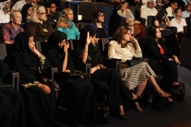
Let me add one thing. You know, under the Saddam Hussein dictatorship, let me
assure you – let’s compare the civilisation in Baghdad before dictatorship and
during the dictatorship. Zeriab, the Iraqi musician –
NADA SHABOUT
You’re comparing
different centuries.
MALEK JANDALI
Exactly. Because they didn’t have a dictatorship at the time. He created –
NADA SHABOUT
Harun ar-Rashid was not a dictator?
MALEK JANDALI
No. [laughter] Absolutely not. Zeriab founded the first music
conservatory in Europe because of freedom. That’s before Bach –
NADA SHABOUT
No, because of patronage.
MALEK JANDALI
- before Beethoven, before the Renaissance. It was not in opposition.
NADA SHABOUT
It was because of patronage. Because of state support
he founded that.
MALEK JANDALI
Because of freedom.
NADA SHABOUT
No.
TIM SEBASTIAN
Okay. I don’t think you’re going to agree. Lady in the corner there. If you’d
stand up, we’ll get a microphone. Thank you.
AUDIENCE (F)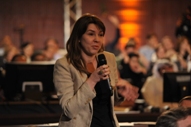
Hello. I’m from Russia. I have a question to
the panellists supporting the motion. Don’t you agree that with certain
censorship, when artists get a lot of freedom there is another major danger:
when they get too much freedom, they fall into the trap of mass production. And
we have a lot of examples of contemporary
art where we have factories producing their artworks. So without any restrictions.. And we have heard it many times that when artists had to
overcome this restriction, when they had to suffer – and let us not talk about
at what cost, because that’s a different
debate, of course; it’s not about good or bad – they produced really great
masterpieces. And when they get total freedom, sorry, they run already
after money. And then it’s not what you produce; it’s how many and at what price.
TIM SEBASTIAN
And did you find that in Russia with the end of Communism, when the
restrictions were lifted, at least for a while?
AUDIENCE (F)
Right now I see it in the – not so much in Russian contemporary art, but I see
it a lot in European contemporary art. In Middle Eastern recently it began a
very dangerous trend when very good artists became serious mass-productive
artists. So is it art, where we are now?
TIM SEBASTIAN
Nat Muller.
NAT MULLER
Well, I think you’re generalising, because there are artists who are not at
all in the commercial art sector. And you can also turn your argument around:
because what if artists are completely restricted in their creative movement?
Then they will all create the same work: that what is permissible, that pleases
the audience. And then you have no differentiation, you have no breaking of
experimentation with astatic rules, with concepts. And what type of art does that produce then?
TIM SEBASTIAN
You want to come back on this?
AUDIENCE (F)
Yes. When there were restrictions, no, they were never producing the same art.
I mean, all these examples through history. There was a huge variety of
expression when there were restrictions. I’m not saying it’s good; it’s just
that’s the history – I’m talking about Fine Art history. But I see another
trend that is very dangerous: it’s so-called ‘commercial art’. And –
NAT MULLER
That’s the galleries. I mean, yes, galleries and – you know. The problem is
also that you have the non-commercial strand of the art world and you have big
money – Sotheby’s, Christie’s, the auction houses: it’s a business. And somehow
we’re all on one end of the scale or slide between them. And this is not to
say.. Artists have to live. Some artists do it by pleasing an audience, selling
a lot of work; and other artists choose to live by very modest means and produce
radical art, say what they want to say and are not interested in big bucks. So
it really depends. You cannot generalise like that.
TIM SEBASTIAN
Okay, let me take a question from the lady in the front row, please.
AUDIENCE (F)
Hi, everyone. I’m from the UAE. My question is: is there any censorship on TV
in the West, or just in the Middle East?
TIM SEBASTIAN
Nat Muller. Censorship.
NAT MULLER
Censorship on what – on TV?
TIM SEBASTIAN
On TV in the West.
AUDIENCE (F)
Yes, on TV.
NAT MULLER
I don’t know. Probably. But I wouldn’t –
TIM SEBASTIAN
Peter Florence.
PETER FLORENCE
Yes. But it’s corporate, commercial censorship largely. Which is why the BBC,
which is an independent, non-governmental organisation, is so absolutely vital.
But to pick up the guy’s point over here about what vocabulary is used on songs
in the morning, the answer is: get that producer
of that show a late-night slot. You’ve got to give your audience, if you’re a
radio show, stuff that’s going to
entertain your audience or they’re not going to listen. So don’t kill the song; just put it on later at night.
AUDIENCE (F)
Hmm! Okay, thanks.
TIM SEBASTIAN
Okay. Gentleman two rows behind you. Thank you.
AUDIENCE (M)
Hello, everybody. I’m from Qatar. I want to ask the panel who does believe
censorship makes a mockery of the arts: what would the panel think if
anti-Semitism or hate words were allowed to flourish – isn’t that bad? Like
look at what Hitler’s propaganda, anti-Semitic propaganda, how it encouraged
the Germans against the Jews – you know, like five million dead or whatever, or
more. So…
TIM SEBASTIAN
Okay. Malek Jandali.
MALEK JANDALI
Absolutely. So what
you’re describing is dictatorship. Hitler’s was a dictatorship. Censorship is a
form of dictatorship –
TIM SEBASTIAN
It’s incitement he’s describing, isn’t it.
MALEK JANDALI
Yeah. I mean, you
know, what you’re saying – censorship.. I mean, who are we to say this art is
bad or good, at the end of the day?
AUDIENCE (M)
That’s the question posed to you: like who gets to decide what’s good and
what’s right? Aren’t we here to kind of.. We want to know who gets to decide.
MALEK JANDALI
It’s up to the
individual. The artist has the right of free expression, so does the viewer. If
you don’t like it, you don’t... That’s your human right.
AUDIENCE (M)
So if I like anti-Semitism, I should allow it to flourish? I’m sure that none
here would allow anti-Semitism to flourish.
Should we let it flourish just because, “Oh, we don’t want a censor”?
MALEK JANDALI
I mean, that’s a
good question, but what is anti-Semitism? To you it might be anti-Semitic; to
others it might not.
NAT MULLER
Well, let’s bring the discussion back to the arts. I mean, I –
AUDIENCE (M)
Anti-Semitic art. [laughter, applause]
NADA SHABOUT
Should you allow a
racist artist to paint?
NAT MULLER
I would not curate that artist.
NADA SHABOUT
So you’re a censor.
NAT MULLER
No, I’m not anti-Semitic –
NADA SHABOUT
Should he be
allowed?
NAT MULLER
- and I’m not interested in anti-Semitism. And I think that –
NADA SHABOUT
But should he be
allowed?
TIM SEBASTIAN
Let her answer the question.
NAT MULLER
Oh, I mean, I think if you say that everyone is allowed to express what
they want, it doesn’t mean that curators or institutions.. You know, I as a
curator would not show that artist, because I’m not interested in the message
he or she is conveying. But I still need to wait for an artwork that has
actually incited a hate crime, like that really urged people to hate, to commit
murder. I don’t know. I’ve seen it the other way round: I’ve seen in France
people actually – Andres Serrano’s Piss that fundamentalist Christians completely vandalised a work in the museum. I’ve seen that happen.
TIM SEBASTIAN
Peter Florence. And then Malek Jandali.
NADA SHABOUT
And isn’t that hate – isn’t that a hate crime?
PETER FLORENCE
Can I do your question bang right on the nose? The answer is: yes, free
expression is not just for people who agree with you. So if there is
anti-Semitic art – it’s not going to flourish, by the way – but if you want to
put it on, you put it on. Similarly, as long as you respect the opportunity
that the rest of the world will have to put anti-Islamic art or anti-Christian
art or anti-Hindu art or any – any – anybody who opposes must have equal
freedoms. I think that’s the principle that people have to defend.
AUDIENCE (M)
Won’t that encourage more hate and more political instability of anti-gay
rights?
NAT MULLER
Or maybe it will actually make people think, that they do not disagree
with it.
PETER FLORENCE
Exactly. It will expose the essential fascistic position that it expresses.
AUDIENCE (M)
It didn’t do that in the case of the Jews in the 1940s. What makes you think
that it will do that now and it will not –
PETER FLORENCE
The Jews weren’t persecuted by art.
AUDIENCE (M)
But Hitler’s propaganda definitely helped put the Germans behind him.
PETER FLORENCE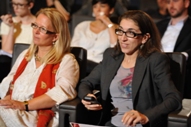
I disagree fundamentally.
TIM SEBASTIAN
Malek Jandali.
MALEK JANDALI
What we need to do:
we need to differentiate between morality and artistic expression. Let me give
you an example. The naked cow that God created in India is holy. We can’t even
touch it, we can’t even eat it, right. But here we have hamburgers every day.
That’s a question to you to think about.
TIM SEBASTIAN
I think you’ve got some puzzled faces. [laughter] Would you like
to explain that point?
MALEK JANDALI
Anybody had a
burger today? [laughs]
TIM SEBASTIAN
Nat? You’re not going to add to it. Lady in the front row. Yes. Another
question on cows, I imagine, [laughter] naked or otherwise.
AUDIENCE (F)
Hi. I’m from America. I have a question for Miss Shabout. In the context of an
educational environment, those of us who are educators within the arts, could
you agree that within that context, in the context of a classroom, this
university campus, could you agree that censorship of those young artists
should not be allowed?
NADA SHABOUT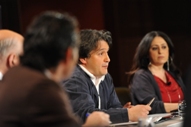
Absolutely. I
totally agree.
AUDIENCE (F)
Thank you.
NADA SHABOUT
In education,
nothing should be censored.
MALEK JANDALI
So you should come
to our side. [laughter]
TIM SEBASTIAN
Funny how often that happens. Okay, a gentleman in the third row.
AUDIENCE (M)
Hello. I’m from India. And my question is:
how do we find a middle ground between censorship and cultural
sensitivity?
TIM SEBASTIAN
Peter Florence.
PETER FLORENCE
Oh, thanks. [laughter] By testing it.
NAT MULLER
Absolutely.
AUDIENCE (M)
Could you explain what you mean by that?
PETER FLORENCE
The artist keeps exploring – keeps exploring the world, keeps exploring ways of representing the world, keeps exploring ways of imagining the world. And they will run into censorship, and they will run into sensitivities, and they will either find a way round it, or they will retreat from it, or they will be locked up, or they will be successful. It’s only by trial and error.
AUDIENCE (M)
But doesn’t that limit them, in a way, if they’re not..?
PETER FLORENCE
It makes very heavy demands upon them and it gives them an incredible challenge. But if you want to be an artist, that’s the challenge you face. Otherwise, go and do some internet shopping. [laughter]
TIM SEBASTIAN
You’re happy with that? Gentleman in the front row. Yes, you, sir.
AUDIENCE (M)
Good evening. I am from Qatar. What do you say –
TIM SEBASTIAN
If you could hold the microphone up a little closer. Thank you.
AUDIENCE (M)
Okay. What do you say about the Denmark artist who made fun of our Prophet,
peace be upon him?
TIM SEBASTIAN
Nat Muller, you want to take..?
NAT MULLER
Well, in Denmark he wasn’t allowed to do that.
AUDIENCE (M)
So he created a hate between nations. So. [laughter]
TIM SEBASTIAN
It’s a clear question. [laughter]
NAT MULLER
I mean, what kind of response do you want from me – what do I think about
it? Do I think..
AUDIENCE (M)
Should not there be restrictions?
NAT MULLER
Should it be
published, should it not be published?
AUDIENCE (M)
It should not be published. They should be censored.
NAT MULLER
Well, he upset a
lot of people. And whether I agree with his drawing or don’t agree with his
drawing is not to the point. But in the context of Danish society he was free
and had a right to publish that drawing.
TIM SEBASTIAN
Do you want to ban anything that might upset people?
AUDIENCE (M)
Yeah. He should not do that, creating hate.
TIM SEBASTIAN
Where do you draw the line? Where do you draw the line?
AUDIENCE (M)
They should be censored.
TIM SEBASTIAN
Anybody who upsets anybody should be censored?
AUDIENCE (M)
Yeah.
TIM SEBASTIAN
Yeah?
NAT MULLER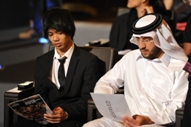
That’s going to be
a nasty world.
TIM SEBASTIAN
You’re not going to have much art, are you. [laughter] Peter Florence, do you want to comment on that?
PETER FLORENCE
You’re absolutely right. He was in Denmark: he’s not subject to any law that
proscribes him from drawing anything he wants. He is, however, as it
transpires, subject to other influences and other forms of censorship from
states that he has no connection with at all, who impress upon Denmark the
urgent need to suppress that crime. Now, you can look at whether or not Denmark
should have found a way to gain more support for freedom of speech, but I think
you’re running into there what the gentleman described: that is one of the
limits of what is acceptable, and what is legal, and what is permissible. For
what it’s worth, you will find in every society places where people will not
stand up for a particular ‘offence’. But I would disagree with you
fundamentally, that I think offence is not bad. I don’t think people
should be censored for upsetting other people, and I think actually that is
part of the function of art: is to challenge your assumptions. Now, you may not
like it. You may find that a billion Muslims may not like it. But there are
seven billion people on the planet, all of whom have survived, differently,
with pluralism and diversity. And part of the respect is respecting other
people disagreeing with you.
MALEK JANDALI
May I answer the
question from a different point of view?
TIM SEBASTIAN
Yeah, go ahead.
MALEK JANDALI
From
an Islamic point of view. When Islam conquered most of the world, they did not
demolish the statues of pharaohs and Rameses and said,
“Oh, those are anti-Islam.” They did not demolish the pyramids. They
actually accepted them, because those were human accomplishments. And they built upon them, and they learnt from them.
They learnt from the Indians, they learnt from the pharaohs, they learnt
from the Christians, from the Jews, and they built upon them an Islamic
beautiful symphony of humankind, of tolerance. And that’s why we progressed. We
were in Saudi Arabia with no knowledge of mathematics or anything, and we
excelled into Alhambra, into architecture, into the climax of humanity
and human rights.
TIM SEBASTIAN
You don’t look very convinced by any of the
arguments you’ve heard. The panel hasn’t changed your mind?
AUDIENCE (M)
No.
NADA SHABOUT
Can I – can I…
TIM SEBASTIAN
No? Was that a yes or a no?
AUDIENCE (M)
No. They haven’t. Nada Shabout, yeah.
NADA SHABOUT
Yeah. Just to say one thing.
MALEK JANDALI
You would say that Muslims should have demolished the..?
TIM SEBASTIAN
No, let Nada have a word.
NADA SHABOUT
No, no. Let me just ask this: what was the intention of the cartoons – was it
adding beauty to the world to build on for a better society or civilisation, as
not demolishing the pyramids? I don’t think it’s the same situation here. I
think these cartoons – and they are cartoons, and the content of them was very
specifically inflammatory. It’s like a hate artwork. Yes, if you do not want to
censor, then it’s free – everyone should do it. But then the reaction to it
should be accepted as well.
MALEK JANDALI
I was greatly offended as a Muslim artist, but I wouldn’t go kill him.
NADA SHABOUT
But I agree with you, I am not going to go kill anyone either.
TIM SEBASTIAN
But you wouldn’t have banned it either?
MALEK JANDALI
No. That’s his humankind expression. Who created him? God created him. So.
NADA SHABOUT
Yes. Sure. But then the reaction should be just as accepted. [laughter]
TIM SEBASTIAN
Okay, I’m going to take a question from the lady in the second row there. Yes,
you, yeah.
AUDIENCE (F)
I’m from Algeria. I just ask this question specifically for Peter and Nada, who
are for the censorship. I just would like to know at which extent –
TIM SEBASTIAN
I don’t think they’re supporting censorship; they’re against the idea
that censorship has made a mockery of the arts, but they’re not supporting
censorship.
AUDIENCE (F)
Yeah. They are correct on censorship, I guess, the creation of censorship. I
just would like to know at which extent would you advocate for censorship when
it goes at the limit of bans and then touching into human dignity and human
rights? And I’m just having in mind one of the latest trials in Tunisia for
this TV director who wrote the custody movie called Persepolis.
NADA SHABOUT
I will never advocate for censorship. This is not what I am talking
about. I am talking about certain limits, certain restrictions, certain rules
to not have confrontation in every aspect – like, for instance, the cartoons of the Prophet. But no, I am not by any
means advocating for censorship. I
would accept cultural sensitivity, yes, because I just don’t see the point of
not having it. I don’t think always a shot is the way to deliver a
message; sometimes negotiation is much better.
AUDIENCE (F)
So, but I can’t see like there is no limit, or can you put a limit?
NADA SHABOUT
Put a limit to..?
AUDIENCE (F)
I mean like a censorship cannot go against freedom of expression or, at least,
putting someone into jail or killing someone. Maybe there would be a limit.
NADA SHABOUT
Of course not… Of course. I mean, if I’m understanding your question, of course
I will not accept that censorship should allow for something like this. I mean,
I think there should always be a civilised discussion. So there should never be
jail or, you know, killing anyone.
NAT MULLER
Nada, sometimes a civilised discussion is impossible.
NADA SHABOUT
That’s true. It’s actually about –
NAT MULLER
And what happens then?
NADA SHABOUT
That’s why I say ‘cultural sensitivity’: so we don’t get to that point.
NAT MULLER
But sometimes cultural sensitivity and a work is censored, so it disappears
from the world, and no one talks about it.
NADA SHABOUT
Well, no, actually, it’s the opposite. If I speak my mind freely about certain
issues, for instance, anywhere in the world, I will be banned from entering.
Then my voice will never be heard. So by negotiating how much I say –
NAT MULLER
If you aren’t able to negotiate?
NADA SHABOUT
You find ways to negotiate.
NAT MULLER
Sometimes you can’t.
NADA SHABOUT
Always can. [laughter]
TIM SEBASTIAN
Okay, all right. Gentleman there. We’ll take a final question from you. Please
stand up – they’ll know who to pass the mike to.
AUDIENCE (M)
Hi. I’m from the United Kingdom, and I’m just wanting to ask: let’s say we go
ahead with this censorship, won’t this eventually lead to destruction of all
forms of art: for example, the dictator Franco in Spain, he exiled many poets
and banned poetry – well, extensively – and this generally created a generation
of people who basically had no culture and no history.
TIM SEBASTIAN
I think we’ve more or less answered that, haven’t we, in the course of the
debate? Anybody else got another question? The lady in the pink. Yes. A
microphone, please.
AUDIENCE (F)
Thank you. I’m from Syria. Everybody’s talking about censorship as a society doing the censorship, a cultural sensitivity censorship. As we know in Syria
and in a lot of the Middle East, a person doing the censorship is someone
either in the government, someone not associated with the arts, someone with a
lot of money. And a lot of time it kills very good art because the person censoring it doesn’t understand it. Or in Malek’s
life it was a couple of thugs going to his house. So a lot of time the
person doing the censoring is not someone that is qualified to judge that art.
TIM SEBASTIAN
You’d agree with that, wouldn’t you?
MALEK JANDALI
Absolutely. I mean, that’s due to ignorance. And ignorance is the result of
dictatorship.
AUDIENCE (F)
Exactly.
MALEK JANDALI
I mean, we have a Minister of Culture who never heard of ‘liberate’. Where a
Syrian in our civilisation invented the first musical notation in the world. He
shouldn’t be the Minister of Culture.
AUDIENCE (F)
Exactly. And so does a lot of other art censors. Censors, the people that do
the censorship, are a lot of time people that don’t understand the art.
MALEK JANDALI
Let me generalise. In the Arab world that’s why we have the Arab Spring: it’s
for freedom and human rights. And we are
sick and tired of dictatorship and the violation of human rights. We are having the Arab Spring in Syria today. We’re paying the price. Innocent
children are being murdered as we speak
right now. It’s wrong. It’s anti-human. And that’s why we have the Arab Spring: we want to be free to express our freedom, and we want to have
qualified people representing us in government – in the Ministry of Culture, in
art – and have the freedom of expression.
TIM SEBASTIAN
Do you want to come back on that?
AUDIENCE (F)
I absolutely hope that we will get there. But I absolutely also agree with the
fact: if you don’t like something, don’t go
there. If you don’t want to listen to a music, change the radio channel. If you don’t [want to] watch a certain piece of art, just go to the next one.
But I do not agree that we should tell artists: “Because of this, you need to
do this in your art.” I think that’s the anti-thesis of art.
TIM SEBASTIAN
So make the decision yourself? You’re saying make the decision yourself, each
individual for themselves, what they want to see and what they want to hear?
AUDIENCE (F)
Absolutely. Absolutely. Exactly.
TIM SEBASTIAN
Okay. We’re going to go, ladies and gentlemen, in a minute to the vote. But
before we do, I’m going to ask each of the
panellists just to give us a closing sentence to crystallise their thoughts on the motion. Nat Muller, would you like to go first and we’ll work our way
round in a semicircle. One sentence, please.
NAT MULLER
Censorship makes a mockery of the arts
because it completely runs contrary to what the arts are and what the
arts can do.
TIM SEBASTIAN
Malek Jandali.
MALEK JANDALI
The first condition of progress is the removal of censorship.
TIM SEBASTIAN
Peter Florence.
PETER FLORENCE
If you believe that censors should win and
should decide what art is, if you believe that censors make a mockery of
artistic aspiration, then you have to support the motion. If you believe that
the human spirit can be triumphed and projected through art, then you should
oppose it.
TIM SEBASTIAN
Nada Shabout.
NADA SHABOUT
Really I have nothing else to say.
TIM SEBASTIAN
No, one sentence.
NADA SHABOUT
Well, okay. ‘Censorship’ is an abused word that does not necessarily always
mean oppression. So, as Peter said, you know, the human spirit will always
succeed.
Vote result
TIM
SEBASTIAN
Okay, all right. Ladies and gentlemen, we are
now going to go to the vote on the motion: “This House believes censorship
makes a mockery of the arts.” If you would just take your voting machines, let
me just explain to you how they work. If you want to vote for the motion – that is the side represented by those on my right
– you’re going to need to press button 1 in a moment. If you want to vote against the motion – the side represented by those on my left – it’s button 2. Whichever button you want to press, please do it now. You only have to press once. We will have the results for you in about 15 seconds’ time. Just a reminder that this debate is going to be shown on BBC
World News: that’s going to be available to some 300 million people around the
world. We hope you’ll watch it. It’s going to be on the air this weekend.
All right, the vote is coming up now. There we are: [applause] 58 percent
for the motion, 42 percent against. The motion has been carried. All it
remains for me to do is to thank our distinguished
panellists – thank you very much indeed for coming. Thanks to you, the
audience. That’s it from the Doha Debates. Have a safe journey home.
Good night. Thanks for coming. Thank you very much. [audience applause]
Watch online




